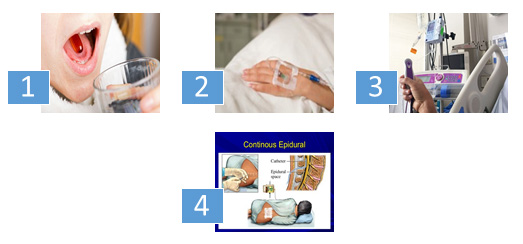The day of the surgery
In the morning, before leaving for the hospital.
Please follow these recommendations:
- Shower again in the morning to reduce the risk of infection. Follow the instructions given to you if you were told to wash with a specific soap.
- Do not apply lotions, creams, perfumes, make up, or nail polish..
- Do not shave or cut your body hair in the area of your surgery. This can increase your chance of getting an infection. If needed, some of your body hair will be removed at the hospital just before your surgery
- Bring the following items to the hospital:
- Hospital and Medicare (RAMQ) cards
- List of your current medications (your pharmacist can print this for you in advance)
- Toiletries (toothbrush, toothpaste, earplugs, eye patch to sleep, etc.)
- Eyeglasses, hearing aid, dentures in labeled containers
- Non – slip slippers or walking shoes, pyjamas, loose comfortable clothing, CPAP machine (if you need one)
- Please leave your valuables at home (examples: jewelry, money, credit cards, laptops, etc.) as the hospital will not be held responsible for lost or damaged personal items.
When and where to go once arrive at the hospital
Going to the Perioperative Unit (PERI-OP) - Pavilion K, room K1-1601
- Go to the Perioperative unit reception desk at the time that you were given. This will give us the time to get you ready for surgery.
- After registering, a nurse will greet you and will:
- Review your documents
- Ask some questions about your health
- Give you some additional information
- Take your vital signs (blood pressure, heart rate, temperature, check your breathing and oxygen level)
- Do any final tests
- Answer any of your questions
- You will also be asked to change into a hospital gown.
- Your personal belongings will be given to your family. If your family is not present, your belongings will be stored in a secure place. Please note that the hospital is not responsible for lost or damaged personal belongings.
- You will be transferred to a holding area.
- Before your surgery, the anaesthetist and the surgeon will meet you to review the surgery, the anesthesia, and talk about pain management.
- Your family are welcome to stay in the waiting room. A computerized system is available to track each phase of your surgery.
Going to the Operating room (OR)
- In the operating room, you will notice that all the operating room staff are fully dressed in protective equipment for your safety.
- It is common for members of the surgical team to ask you the same questions regarding your health and surgery. This is also done for your safety.
- Before the surgery begins, the surgical team will do the final preparation, which can include applying monitoring equipment to your body, inserting catheters and tubing, and preparing your skin for the surgery.
- Be aware, the operating room is kept cool.
- Once the surgery is done, you will be transferred to the recovery room.
Going to the Recovery room - Post Anesthesia Care Unit (PACU)
Once in the recovery room, you will be monitored closely.
- The nurses will monitor your vital signs (blood pressure, heart rate, temperature, breathing, oxygen level) and any surgical bandages/drains that you may have.
- You may have different catheters and tubing from the surgery.
- The nurses will manage your pain and nausea, if present.
- There are different ways to manage your pain after surgery including:
- taking pain medications by mouth;
- receiving pain medication through your intravenous (IV) catheter;
- receiving medication via a machine called an intravenous Patient Controlled Analgesia (PCA);
- This device allows you to control the timing of painkiller injections for the first few hours after surgery.
- having an epidural analgesia:
- This is a small tube that is placed in your back before the start of the surgery, which allows for medication to be delivered to block your pain.
- any other methods as ordered by the Anesthetist and/or surgeon.
- You will stay in the recovery room for a couple of hours. Once the team determines you are stable, you will be transferred to a unit in the hospital, or back to the Perioperative unit.

